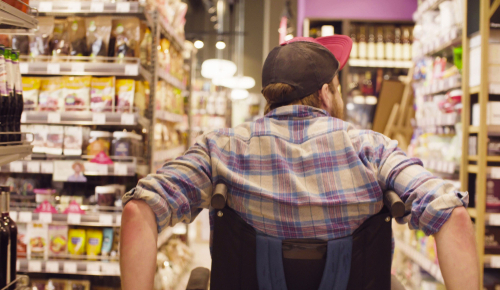The pandemic has encouraged more people to shop locally. However, many disabled customers still favour larger organisations over more local retailers believing that with greater resources larger organisations are able to do more to make their stores accessible. This often means disabled customers travel longer distances and are paying more for services and goods because businesses in their local communities just don’t appear to be accessible to them.
Many of the queries that we receive through our SME Advice Service are from high street retailers asking about things they can do to make their shops more attractive to disabled customers. There are some quick wins for retailers. Things they can do straight away with no or minimal cost and which will instantly open up their businesses to more people in the local community.
Grant access to assistance dogs
When is the last time you reviewed the signs in your shop window? The traditional ‘no pets allowed’ poster is still seen too frequently on the high street, with many small business owners unaware of its negative implications for disabled customers.
Assistance dogs provide vital support to a wide range of disabled people and people with long-term conditions, including people with visual impairments, people with autism, and people with epilepsy. You can pick up an ‘Assistance Dogs Welcome’ sign for just a few pounds. A small expense to open your doors to more customers.
Show that you’re ready to help
Most disabilities are non-visible. Always be on the lookout for people who may need extra assistance and offer help regardless of whether you think the person has a disability.
Always greet customers warmly and by simply asking someone if they would like assistance, it gives your customer an opportunity to discuss their requirements with you.
Declutter and clear space
My family owned a local convenience store for over 35 years in East London, and I know from personal experience just how challenging limited floor space can be.
But aisles cluttered with products waiting to be stacked on shelves, narrow pathways, and inaccessible spaces are huge barriers (literally) for wheelchair users and to people who need to use walking sticks to get around. They can also be difficult to navigate for people with prams and buggies. By making sure tasks such as stock replenishment are done in a timely manner or outside of business opening times means your shop floor is clear of clutter, removing obstacles, and improving the accessibility of your store.
Be mindful of your doors and entrances
Ideally, your shop would have automatic doors at the entrance, however, these are often costly to install and maintain and therefore not always a realistic proposition for a small retailer. One thing you can do improve accessibility for disabled customers is to always ensure the counter is in the line of sight of the entrance so staff are always on hand to help people enter your shop.
Another cost-effective solution is to fit long door handles between 0.9m and 1.20m from the floor, these will help ensure they’re at a comfortable height for everyone and within reach for most wheelchair users.
Make information inclusive and accessible
Posters and general written signage are important for any smaller business, whether it’s product catalogues, posters, or something as simple as a price tag. To help make your information more accessible, avoid blocks of heavy text, convoluted font types, italics, or unnecessary capitalisation. These can all make your information more difficult to read.
Where possible, try and include images to go with the text, align the text to the left, keep a constant layout, use a strong colour contrast, and ideally offer alternative formats such as easy read, large print, or braille.
Taking simple steps to make your business more disability-friendly is not only the right thing to do, but it also makes great business sense. Business Disability Forum has launched a free and confidential advice service to help smaller businesses operating in the London area to become more disability aware. We also have information available for all businesses on getting started on disability inclusion. Do get in touch if you would like to find out more.
Parma Sira is small business disability adviser for Smarter London SMEs. Find out more at https://businessdisabilityforum.org.uk/our-services/smarter-london-smes/ or email Parma at sme@businessdisabilityforum.org.uk
 Talking Retail Grocery and product news for independent retailers
Talking Retail Grocery and product news for independent retailers






